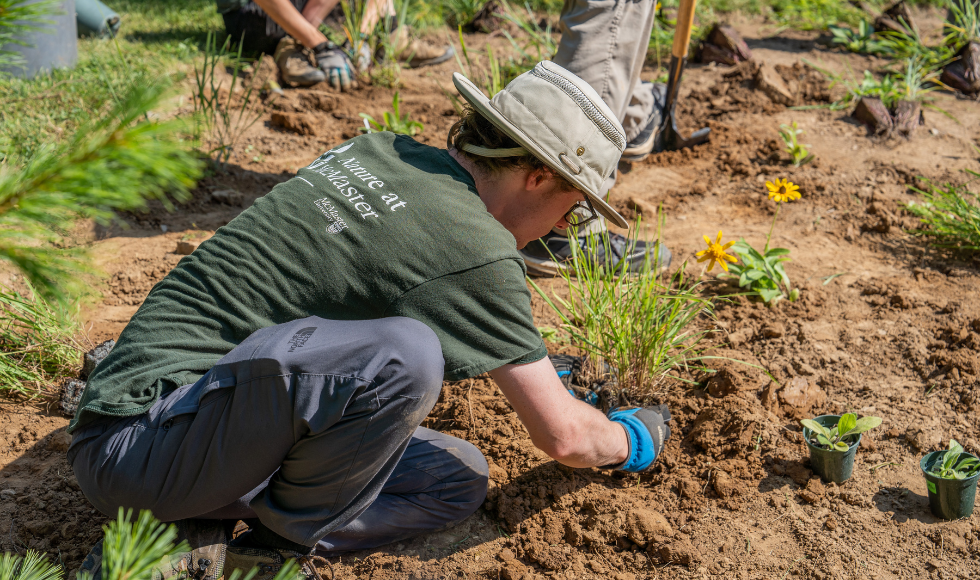New nesting garden to help boost population of native bees

A group of students, faculty and staff worked together to plant a new bee nesting garden on McMaster’s campus this summer.
When people think of bees, they often think about the honeybee. But Sim Jolly is hoping a new bee nesting garden on McMaster’s campus will make people think about native bees and the huge impact they have on our planet.
“These pollinators are deeply, deeply important to the health of ecosystems and food security around the world,” says Jolly.
Native Bees are pollinator populations that are indigenous to a certain region. Ontario is home to over 400 distinct native bee species, including solitary bees, social bees and many more.
“Due to anthropogenic factors such as climate change, and primarily habitat destruction, their population is rapidly declining,” says Jolly. “And so, gardens like these are crucial to increasing the populations of these species.”
The Arts & Science and Interdisciplinary Minor in Sustainability student is part of a group of students, staff and faculty who pitched in to help create the native bee nesting garden this summer.
The garden, tucked behind Alumni Memorial Hall on McMaster’s main campus, is made up of a variety of pollinator plants and features ideal spots for native bees to lay their eggs.
“They create nests in the ground, however, due to pesticide use, parasites and habitat destruction, their underground nests are being destroyed, therefore leading to the decrease in populations. And so, gardens like these will provide a space for them to create nests,” says Jolly.

The addition of the garden will cater to the wider variety of bees found in the area, says Susan Dudley, a professor of biology in the Faculty of Science and one of the project champions for the third-year sustainability students.
“What we do here when we create these gardens is we take an area that would otherwise be a bit of a desert to the bees and we provide habitat nesting sites,” says Dudley. “This nesting garden is going to have sites where clay-loving bees and sand-loving bees and ground nesters can nest.”
The fact the garden backs on to the Royal Botanical Gardens is another reason why the location was selected, with more native bees being drawn to the site.
The groundwork for the garden was laid by a group of third-year sustainability students as part of their class project.
Emma Chau, Alicia McLinden, Crystal Gilbert and Ekim Bagree designed the garden, consulted bee experts from the Biology Department and landscapers from McMaster’s Grounds Department. They also created a toolkit for the implementation of the garden complete with a materials list, maintenance plans and proposed educational elements.
McMaster’s Grounds Department provided many resources, including funding, laying of the soil and benches, and maintenance of the garden during the hot summer months.
Other major sources of support have been in the form of locally sourced native plants donated by the Biology Greenhouse, funds from Nature at McMaster (an initiative out of the President’s Office) and funds from the Parks Canada Ecological Corridors Program.
The garden is the next step in the Native Bees at McMaster project, which has seen 75 bee homes (birdhouse-like structures that contain nesting materials) installed throughout campus.
In 2020, the Native Bees at McMaster project received designation as a Bee City Campus from Bee City Canada.

The planting happened with the help of volunteers from the Academic Sustainability Programs Office, Nature at McMaster, Biology Greenhouse volunteers and McMaster Facilities summer staff.
Another planting at the site is scheduled for November 7, 2023.
Jolly says participating in sustainability-oriented projects like this one can give people a sense of control over the sometimes overwhelming realities of climate change.
“I think it’s a really positive thing to be able to do on a personal level,” says Jolly. “Not only is it really important for the earth and for the health of global ecosystems, but on an individual level it feels soothing in a way.”
“I’m also hoping that more and more research is going to be taking place on native bees because compared to other species, not that much is known about them,” says Jolly. “And hopefully the work that McMaster’s doing will inspire other universities and other people to take the same action.”
Want to get involved?
Follow @macsustain on Instagram or visit the Academic Sustainability Programs Office website.


